|
|
|
Sort Order |
|
|
|
Items / Page
|
|
|
|
|
|
|
| Srl | Item |
| 1 |
ID:
150586
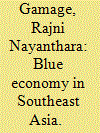

|
|
|
|
|
| Summary/Abstract |
While the term “blue economy” has found increasing traction with a variety of stakeholders (both state and non-state) in the recent past, a working definition of the concept at a regional or global level is yet to be arrived at. This paper begins with a brief examination of the concept of blue economy, followed by a discussion of blue economy initiatives undertaken or aspired towards at the regional level of Southeast Asia. In doing so, three fundamental propositions are made: First, the prospects for blue economy in Southeast Asia remain optimistic despite difficulties in collective action posed by the “ASEAN Way”, an obstacle which appears to have been considerably overcome in the launching of the ASEAN Economic Community (AEC) in 2015. Second, Indonesia’s growing economic and political profile allows it to assert the reins of regional (and even global) leadership on blue economy, without necessarily limiting itself to the Association of Southeast Asian Nations' (ASEAN) means and mechanisms. Third, while traditional security issues, both between Southeast Asian and extra-regional powers and within Southeast Asia over outstanding sovereignty and jurisdictional disputes, may impede cooperation on tackling non-traditional (maritime) security issues in the region, they may not prove as formidable an impediment against the successful realisation of blue economy initiatives.
|
|
|
|
|
|
|
|
|
|
|
|
|
|
|
|
| 2 |
ID:
150594


|
|
|
|
|
| Summary/Abstract |
The Great Lakes are a group of interconnected lakes located on the Canada–United States border. Lake Superior, Michigan, Huron, Erie and Ontario form the largest group of freshwater lakes on Earth, and contain around 21% of the world's surface fresh water by volume. These lakes suffer from considerable microplastic contamination. Despite this awareness, citizens around the lakes struggle to take action. With over 80% of plastic debris in the world's water bodies being contributed from land, the solutions for eliminating microplastics have to come from changes in consumer behaviour and by stopping contamination at the source. “eXXpedition Great Lakes 2016″ was designed as a one-day mass engagement event to bring the science of microplastics to citizens across the region, allowing them to experience first hand the presence and impact of this pollution. Volunteers collected water samples and conducted shoreline clean-ups on the Great Lakes and connecting waterways. Sailing vessels led by female scientists specialising in plastic pollution, human and environmental health were also launched from key cities in both Canada and the United States. The approach was to utilise the power of citizen engagement to promote clean-water advocacy and action in North America. By experiencing the issue of microplastics pollution first hand, it was hoped that participants would feel an increased sense of responsibility and consider protection of the environment as their duty, which would hopefully lead to changes in consumer behaviour. This paper shares the experiences during the event.
|
|
|
|
|
|
|
|
|
|
|
|
|
|
|
|
| 3 |
ID:
150592
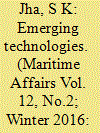

|
|
|
|
|
| Summary/Abstract |
Developments in the field of three-dimensional (3D) printing, autonomous ships and green technologies in recent times have drawn the attention of the shipping world. Each of these technologies has already been through decades of the development phase and now offers diverse applications across sectors. This paper examines each of these technologies from its inception to its impact on the shipbuilding industry, both warship and mercantile marine. Early impacts on shipbuilding are noticeable in refit and repairs, retro-fitments and logistic chain improvements. On-board/next port of call 3D-printed spare parts, tools and accessories are becoming increasingly common. Effective use of this technology to manufacture “one of a kind” steel parts or smaller and complex parts are facilitating substantial cost and time reductions during refits, repairs and retro-fitments. In the run-up to a fully autonomous ship, systems with increased autonomy are available as upgrades. Implementation of green technologies to conform to international regimes is increasing the scope of work of the refits and upgrades. Eventually, as newer hull and system designs mature and complete sea trials, the impact will be felt in new constructions and shipbuilding trends.
|
|
|
|
|
|
|
|
|
|
|
|
|
|
|
|
| 4 |
ID:
150593


|
|
|
|
|
| Summary/Abstract |
The maritime piracy issue drew significant global attention post-2012. The response from the major nations, even those geographically distant from the Indian Ocean Region (IOR), has been highly pro-active. Two important changes that are relevant to this paper are the increased deployment of multi-national naval forces for anti-piracy operations and also re-routing of the shipping lanes closer to the shores. The acoustic impact of these actions was completely ignored but their impact on the marine ecosystem needs to be reviewed. A rare stranding of a blue whale in June 2015 and a Bryde's whale in January 2016, off the west coast of India, are a possible manifestation of the degraded acoustic habitat due to high levels of low-frequency ambient noise in the region. The paper presents an investigative analysis of the two reported events and their correlation with acoustic habitat degradation which may be attributable to increased shipping in the region.
|
|
|
|
|
|
|
|
|
|
|
|
|
|
|
|
| 5 |
ID:
150588


|
|
|
|
|
| Summary/Abstract |
Indonesia's geo-strategic position, its huge archipelagic disposition and its large population, which accounts for close to two-fifths of Southeast Asia's total population, can be said to possesses some natural characteristics needed for emerging as a maritime power. Maritime consciousness has always been possessed by Indonesia and many initiatives have been undertaken by the previous leaderships to cater to its maritime interests, but these initiatives have not been able to place Indonesia in the category of a maritime power. The current president has for the first time publicly promulgated his vision of making his country a maritime power. In this context, the study will aim to analyse Indonesia's potential as a maritime power by examining whether the measures undertaken by Jokowi and his predecessor, Yudhoyono, can help this vision in taking shape.
|
|
|
|
|
|
|
|
|
|
|
|
|
|
|
|
| 6 |
ID:
150591


|
|
|
|
|
| Summary/Abstract |
The Indian Ocean Rim Association (IORA) identified maritime safety and security as one of the six priority areas for cooperation among the member states. Hence, there is a need to develop a legal framework for maritime security in the Indian Ocean Region, ratify applicable international legal conventions on maritime security and create a system for the resolution of disputes among IORA member states. This paper proposes that there exists a strong case for the IORA charter to be amended to provide for a mechanism that IORA member states can use as a forum for dispute resolution. It argues that such a forum will create a platform for member states for deliberating weighty and controversial issues without jeopardising progress within the association. The paper further proposes the creation of an IORA legal group of experts whose mandate should include the development of a maritime security framework for the Indian Ocean Region, which is critical to the promotion of good order at sea.
|
|
|
|
|
|
|
|
|
|
|
|
|
|
|
|
| 7 |
ID:
150590
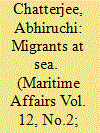

|
|
|
|
|
| Summary/Abstract |
According to the United Nations, the current worldwide displacement is at the highest level ever recorded. Further, the humanitarian crises unfolding in the Mediterranean and the Bay of Bengal have focused the spotlight on the maritime domain as a prominent escape route. They have also raised many questions pertaining to human security and the humanitarian obligations of the states at one end of the spectrum and national security considerations that come with such mass arrivals on the other. However, the two crises have elicited varying responses by the affected state and non-state actors, who have interpreted international law and state obligations differently. This paper seeks to understand and analyse maritime and policy responses to the Syrians in the Mediterranean and the Rohingyas in the Bay of Bengal and Andaman Sea to identify the best practices for states to comply with their international humanitarian obligations while taking state security imperatives into consideration.
|
|
|
|
|
|
|
|
|
|
|
|
|
|
|
|
| 8 |
ID:
150589
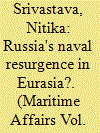

|
|
|
|
|
| Summary/Abstract |
Russia is a leading actor seeking regional influence in Eurasia. Among many aspects of its re-emerging profile, the Russian navy's pre-eminence in the region is noteworthy. Immediately after the disintegration of the USSR, a lack of funding dealt a blow to the Russian navy. However, with the aim of restoring Russian naval power, President Putin began to modernise the Russian navy. Therefore, after setting the backdrop and the strategic outlook of Russia, the study first examines the drivers behind Russia's quest for resurgence and goes on to analyse the trends and intentions of the Russian navy, especially in the four seas of Eurasia – namely the Black Sea, Baltic Sea, Mediterranean Sea and Caspian Sea. The paper also attempts to compare the Russian navy's strength with that of the erstwhile Soviet navy. The study concludes that in order to attain the erstwhile Soviet Union's naval power, Russia would need to overcome a major economic crisis as well as geopolitical challenges.
|
|
|
|
|
|
|
|
|
|
|
|
|
|
|
|
| 9 |
ID:
150587
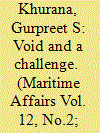

|
|
|
|
|
| Summary/Abstract |
The armed forces are usually conversant with the rules on the use of force against the enemy in the traditional battle space. However, military forces are usually ill-equipped for this when the opponent is not a regular combatant but an un-uniformed person – a militant or even a criminal – operating in seemingly benign environs. This constitutes a serious legal void, particularly given the emerging environment wherein navies would be increasingly tasked to perform non-traditional constabulary functions. The trend is best exemplified by the case of the Indian Navy that was entrusted with the responsibility for the nation's overall maritime security, including coastal and offshore security. This paper examines the concept and the salient issues relating to rules of engagement (RoE) for maritime forces operating in the low-intensity conflict environment.
|
|
|
|
|
|
|
|
|
|
|
|
|
|
|
|
|
|
|
|
|